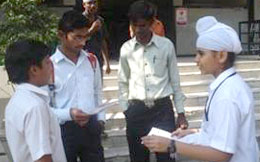
DESD World Festival Forum
Mr. Kartikeya V. Sarabhai, Director, CEE addressed two gatherings in Japan, sharing thoughts on DESD and the way forward. As a keynote speaker at the 'Global Citizen's Conference on DESD 2012' he shared his concept of the paradigm shift this is required in the process of development followed by developing countries, in order to achieve sustainability. He pointed out that ESD is one of the key drivers of change that is required to make this paradigm shift. CEE's experience of successfully initiating a partnership with the Convention on Biological Diversity (CBD) Secretariat in order to integrate ESD in CBD's work was shared. The Conference was organized by the Ministry of Education, Culture, Sports, Science & Technology, Government of Japan in Tokyo, Japan on November 27-28 to share the latest development and trends of ESD in the world.
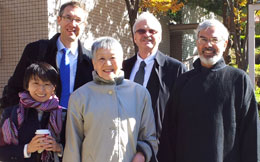
Speakers at the Global Citizen's Conference included Mr. Alexander Leicht (Chief of Section of ESD, UNESCO), Mr. Charles Hopkins (UNESCO and UN University Chairs in ESD, York University, Toronto), Ms. Makiko Imai (Conference Secretariat), Dr. Wu Qing (Professor, Beijing Foreign Studies University), and Mr. Kartikeya Sarabhai (Director, CEE).
As a guest speaker at the 'ESD Theme Conference', Mr. Sarabhai shared CEE's experience in Disaster Risk Reduction based on three major projects taken up by CEE in the last decade. These were in Gujarat following the 2001 earthquake, in Tamil Nadu after the 2004 Tsunami, and in the Kashmir after the 2005 earthquake. The learnings were compared with the more recent Japanese Fukushima earthquake and tsunami. This Conference was organized by DESD World Festival Forum and Japan Council on the UN Decade of Education for Sustainable Development (ESD-J) on November 28. The aim of this event was to share best practices, information, learning technique and experiences related to ESD and further promote ESD movement.
Young Masters Programme in India
With the emerging development paradigm and life-style changes, Education for Sustainable Development (ESD) is viewed as a critical tool to initiate the process of sustainable development to achieve global prosperity and empower people. Young people, especially students are encouraged to participate and facilitate the SD process on a priority basis. Keeping this in mind, International Institute for Industrial Environmental Economics (IIIEE) at Lund University, Sweden has partnered with CEE to launch its Young Masters Programme (YMP) on Sustainable Development in India. This Programme envisions to improve the understanding of sustainability challenges faced today; to develop tools that turn these challenges into possibilities; and to empower young people in terms of personal international networks, hands-on proactive methods, capacity building and local projects that can make a difference.
This programme was launched in India on the October 14 at the ESD Conference organized by CEE during the CBD COP 11 in Hyderabad, India. Under the programme, CEE, in partnership with YMP, will pilot test this programme by closely working with over 30 schools in 9-12 cities across India.

Initiating the process of empowering and capacity building. Mr. Torvald Jacobson, Director, YMP, IIIEE of the YMP team at the Lucknow Workshop.
In order to understand the YMP platform and the operational aspects Mr. Pramod Sharma, Programme Coordinator, CEE and Mr. Sanjay Tiwari, Programme Officer, CEE attended a four-day workshop at IIIEE, Lund University, Sweden in early November. The Workshop helped in understanding the global experiences of the programme and also to plan out the pilot phase for India.
This was followed by a four-day (November 27-30) visit of the YMP team from Sweden to CEE, Lucknow. The CEE team, along with the schools of Lucknow which are part of the pilot phase, received inputs to implement this programme in their selected cities. The YMP India pilot test is also being used as an opportunity to observe ESD learning experiences taking place within schools and nearby communities.
Learning with Nature is Fun
As part of the Children's Forest Programme (CFP) CEE North is conducting nature tours for schools in Lucknow district, Uttar Pradesh. The nature tours are conducted in Kukrail Forest Reserve which is also famous for its Gharial Rehabilitation Centre.
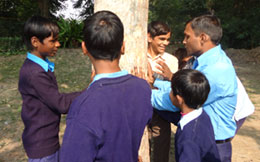
Many ways of learning about a tree.
This year tours have been organized for more than 24 schools. A typical tour is designed for a group of 70-75 students from grades 5 to 10. These students constitute the CFP Action Team in the school. The nature experience begins with an icebreaker where students introduce themselves as they relate with an element of nature. Students sing songs for nature and play educational games to develop an understanding about the area. The CEE team then conducts an interesting nature trail which helps students to learn about the gharials, turtles, and crocodiles, and their importance in our river ecosystem. Officials from Forest Department also interact with children. At the end of the tour, a quiz is conducted based on the day's learning.
Students are motivated to use all their five senses to get to know the nature around them. Students coming from remote rural areas find this visit a completely new experience and a fun way of learning. A special nature tour was also conducted for the Sparsh Drishti Badhit Government Boys Inter College- a CFP school with visually impaired children. CEE team planned all the activities focusing on touch, sound and smell. The nature tour received an overwhelming response from the students.
The CFP is a five-year programme, that began with six districts of UP in 2010 as a component of JICA assisted UP- Participatory Forest Management Poverty Alleviation Project. CEE North has been selected to implement this programme in 100 schools of Lucknow district in three consequent batches.
Zonal Eco-fairs in Rajasthan
CEE Jaipur, in collaboration with Rajasthan State Bharat Scouts and Guides, organized a series of zonal level eco- fairs at Ajmer, Chittaurgarh (Udaipur), Jhunjhunu (Bikaner), Jodhpur, Kota, Madhopur (Bharatpur), Sikar (Jaipur), and Swai. The event aimed at showcasing efforts of eco-clubs and at creating awareness on the vital role of every individual in environment conservation, among school children and other segments of the society.
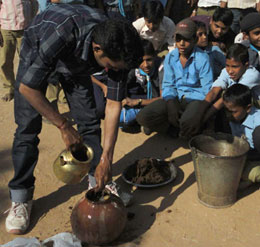
Jhatpat Khaad (Quick Manure) - An activity for waste management demonstrated for Eco clubs.
The participant schools shared their initiatives towards protection of the environment. These included stalls that displayed various eco-friendly items; paintings and information about activities/projects undertaken by them towards the conservation and protection of the environment. The students shared information and knowledge on activities, initiatives and responsibilities towards the environment with the general public.
CEE Jaipur facilitated a variety of fun-filled activities including environmental games; wishing tree; tattoos; face painting etc. Students and teachers displayed their creative side during the painting competition and their intellect during the environmental quiz. An awareness walk organized by Paryavaran Mitras helped to create awareness and sensitivity among the participants, and general public. 1800 students actively participated in various activities. Representatives from Government, Media, youth from colleges and general public also participated in this programme.
The Rural Programmes Group, CEE receives HP Education Innovation Fund for India 2012–Award
The Education Innovation Fund for India (EIFI) is a collaborative project between the HP Office of Global Social Innovation and the India Council for Integral Education (ICIE), an initiative of the Sri Aurobindo Society.
The purpose of EIFI is to identify and collaborate with significant innovative ideas and projects in education that can be developed and scaled to the next level of operation, with the sponsorship of an EIFI Grant.
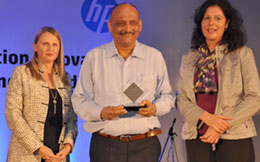
Mr Atul Pandya, Programme Director, Rural Programmes Group received the award at a ceremony held at Hotel Lalit Palace, Delhi on November 27.
This year Rural Programmes Group (RPG) of CEE, Ahmedabad had put forward a proposal to work with government primary schools in the rural tribal belt of Gujarat to enhance the quality of education. This innovative project seeks to bring digital technology in the classroom by providing a tablet to teachers, along with projection facility. The project will also create a virtual resource centre to provide online educational support, training and a monitoring system. The project has been selected as one of the 17 projects, after a long competitive evaluation process across the country. The award includes a grant of INR 10, 00,000.00.
Science-Express Biodiversity Special in November
The Science-Express Biodiversity Special (SEBS) generated great excitement and attracted large numbers during its journey through Bihar, Punjab and Uttar Pradesh in November. The SEBS halted at six stations where there were a number of activities to engage old and young alike. A glimpse of the month.
Gaya, Bihar (October 31-November 2)
Mr. Rameshchadra, ADRM, Mugalsarai welcomed this train that was visited by around 67,900 people. CEE, the resource agency for National Green Corps (NGC) progamme in Bihar, invited schools to visit train and participate in activities. NGC Master Trainers shared their experiences with teachers, and provided their support in getting good participation from schools. Various educational activities that focused on biodiversity conservation were conducted with children. Visitors also took the pledge for conserving biodiversity.
Gorakhpur, Uttar Pradesh (November 3-6)
The Eastern UP Regional Resource Agency (RRA) of the NEAC programme and Paryavaran Mitra District Agency DIET Gorakhpur along with NGC Master Trainers provided their support in organizing the training programme that focused on ways to protect our biodiversity and to promote project based learning for 50 teachers. CEE is resource agency of NGC programme in UP.
Lucknow, Uttar Pradesh (November 7-10 )
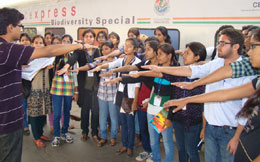
Youth taking the Pledge at the Lucknow Station
Mr. V. N. Garg, Principal Secretary, Forests and Environment, UP welcomed the train at Lucknow. Several officials from Department of Forest, Environment and Education and District Administration were part of the welcome ceremony. The NGC nodal agency UP Pollution Control Board and UP State Biodiversity Board joined hands with CEE for organizing the educational activities. Since the first day, schools were lined up to visit the train. Students and the general public found this exhibition very interesting and informative. Thousands of visitors, youth and students signed the NBA pledge. The educational games conducted by CEE team and youth volunteers received an overwhelming response.
Chandigarh and Punjab (November 15-18)
Activities at Chandigarh were conducted with the support from NGC Nodal Agency and NEAC RRA Punjab State Council of Science and Technology and NGC resource agency Environment Society of India. Around 33 Teachers from Chandigarh, Hoshiarpur, SAS Nagar and Himachal Pradesh joined the teacher training workshop.
Firozpur, Punjab (November 26-28)
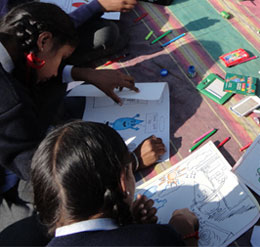
Over 605 students participated in the PCRA Painting Competition, and over 245 teachers were trained duting the SEBS halts in November.
The teachers who participated in the training programme shared their experience of working on environmental projects through the eco-club approach and National Environment Awareness Campaign. Teachers were quite motivated to take at the project-based learning approach, and involve the entire school in environmental activities through Paryavaran Mitra programme.
Bhatinda, Punjab
(November 29-December 1)
The train was visited by more than 550 schools with the hundreds of children from each school. The teacher training was organized with the support from NGC Nodal Agency and Bhatinda Vikas Manch. Students and visitors enthusiastically took NBA pledge for biodiversity conservation. 41 teachers from 7 districts came together for the teacher training.
Hand Print Action
The Government Senior Secondary School, Sirmour, Himachal Pradesh has initiated a number of positive actions, to address local concerns. Planting of 2100 Hara fomeia stems in an area of 1.5 km was undertaken with the objective to prevent soil erosion and changes in the river path. The stems took root within a week of being planted and helped retain the original course of the river.
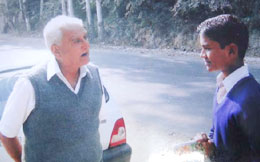
The Handprint Actions are a combined effort of the schools and the community.
The students conducted a survey to learn about and compare cooking gas cylinders, as well as other solar energy-based cooking methods to reduce pressure on biodiversity. They made a live fencing of the 30,000 sq.ft. around the school campus.

All the actions of this Paryavaran Mitra School are being done with the involvement of School Management Committee, Village Panchayat and some funds from Government schemes.
Youth to School and Community: An initiative to strengthen Eco-club activities
With aim of strengthening the action component and reach of the eco-club activities under Paryavaran Mitra programme, CEE Jaipur planned an initiative of Youth to school and community. This initiative, synergized two thrust areas of CEE-Education for Children and Environment Education for Youth-provided youth an opportunity to interact with the community members in order to build awareness on environmental issues and to promote their involvement towards improving the same.
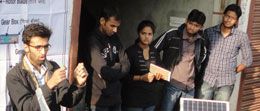
Youth interacting with Community.
A five-member youth team of NIIMS University participated as resource persons. The programme involved interaction with eco-club members and school children of Government Sr. Secondary School, Lalgarh, Bassi. During the interaction, the resource persons provided them with innovative action ideas and also gave demonstrations that would help them to plan their eco-club activities as projects better. During the night-halt, community members were oriented to eco-friendly methodologies that would be useful on a daily basis.
The youth team summarized this exchange as a wonderful experience towards making them self-sufficient in terms of education, communication and technology, and hoped that such a programme could be infused in their regular study projects at the university.
